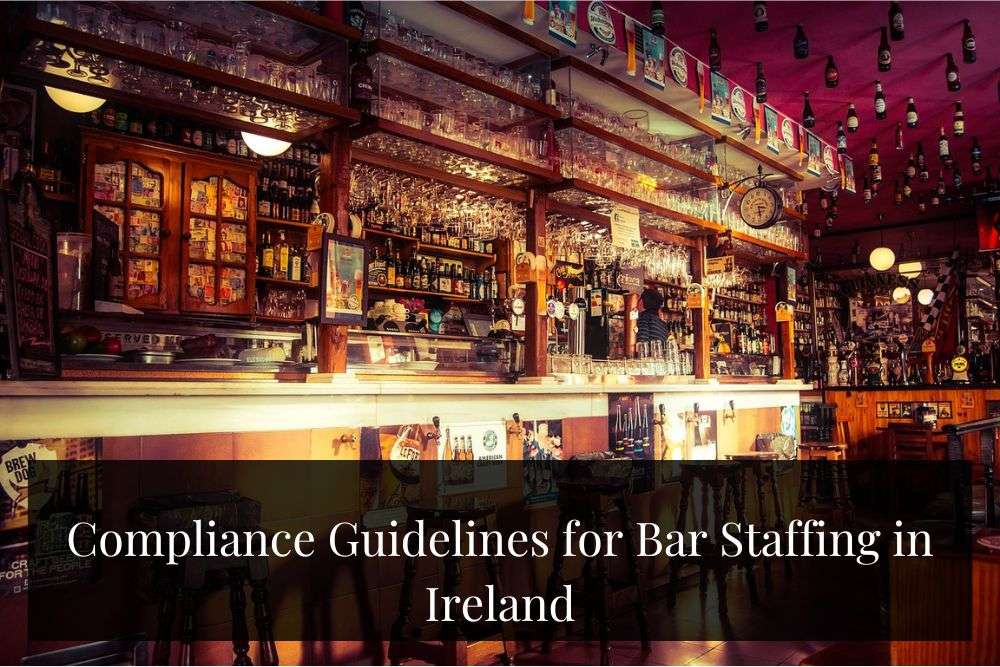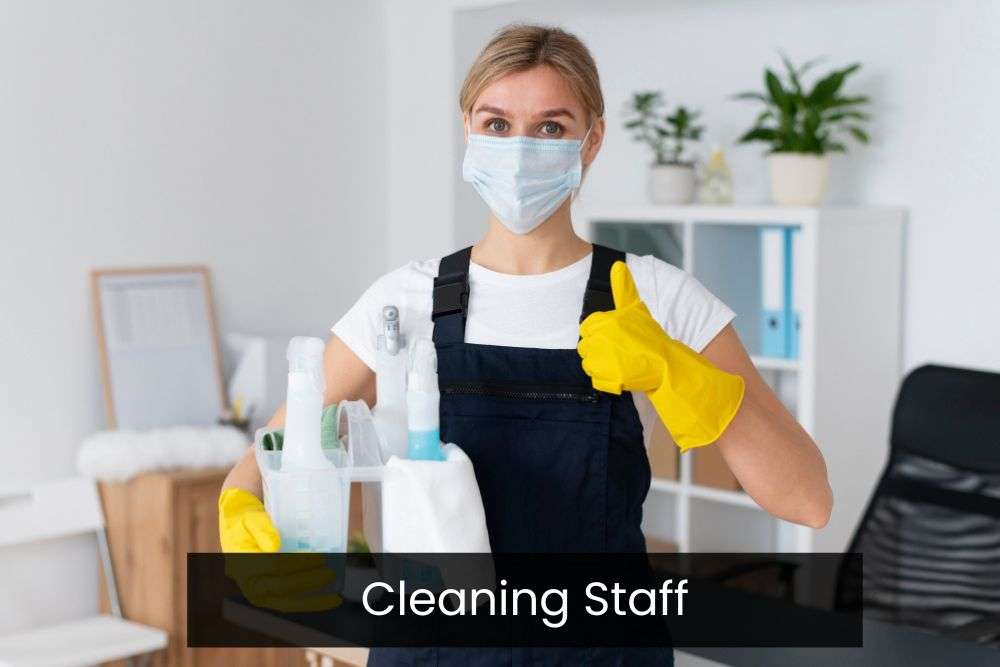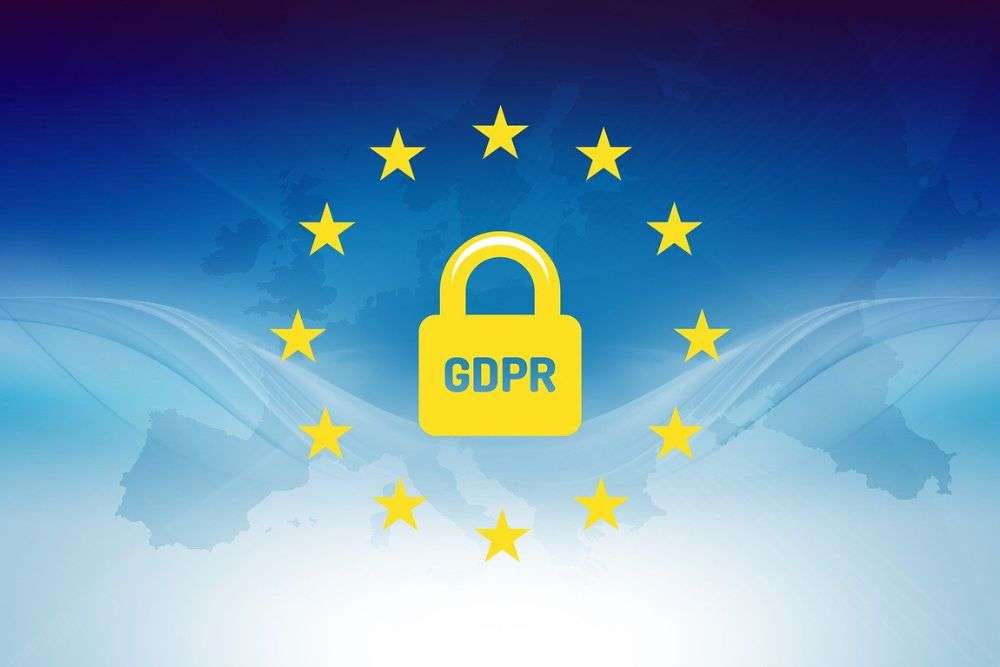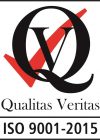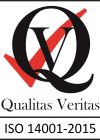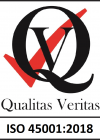In the heart of Ireland, where the lively spirit of its people is matched only by the vibrant energy of its pubs and bars, ensuring the responsible and compliant operation of such establishments is of paramount importance. The seamless synergy between revelry and responsibility is a delicate dance that relies on well-crafted guidelines. In this blog, we embark on a journey to explore the intricate world of Compliance Guidelines for Bar Staffing in Ireland.
Key Takeaways:
- Safety First: Compliance guidelines prioritize safety for patrons and staff, making it the foundation of responsible bar operation.
- Continuous Training: Ongoing training for staff is crucial to stay updated on compliance requirements and best practices.
- Legal Consequences: Non-compliance can lead to fines, penalties, and even license revocation, emphasizing the importance of adherence.
- Proactive Management: Responsible management sets the tone for compliance and fosters a culture of responsibility within the establishment.
- Documentation Matters: Detailed records of compliance efforts, training, and incident reports serve as evidence and demonstrate commitment.
- External Support: Leveraging external auditors and legal counsel can be instrumental in ensuring compliance and addressing issues effectively.
- Community Engagement: Compliance not only fulfills legal obligations but also builds positive community relations and enhances your establishment’s reputation.
1 Why are these guidelines significant?
They serve as the guiding light, ensuring that bars across Ireland not only thrive but also operate within the legal boundaries, prioritizing the safety and well-being of patrons and staff alike. These guidelines are the cornerstone of a thriving and responsible drinking culture that Ireland is known for.
2 Understanding Compliance Guidelines
A. Defining Compliance Guidelines for Bar Staffing in Ireland
Compliance guidelines for bar staffing in Ireland encompass a comprehensive set of rules and standards designed to govern the operation of bars and pubs, with a primary focus on the conduct and responsibilities of bar staff. These guidelines set forth a code of conduct that promotes safe and responsible service of alcohol and the overall management of licensed premises.
B. The Legal Framework and Regulations
To comprehend the significance of these guidelines, one must delve into the legal framework that underpins them. The foundation of compliance guidelines in Ireland is rooted in a robust legal framework that includes the Sale of Alcohol Licensing Laws, the Intoxicating Liquor Act, and various local bylaws. These laws establish the legal parameters within which bars and pubs must operate, and they hold bar staff and establishments accountable for adherence.
C. Implications of Non-Compliance
The implications of non-compliance are not to be taken lightly. Failing to adhere to these guidelines can result in a range of consequences, from fines and penalties to the suspension or revocation of alcohol licenses. In cases of severe breaches, legal action may be taken against the bar staff or establishment, leading to criminal charges. Such outcomes can tarnish the reputation of the establishment, affect its financial stability, and, most crucially, endanger the safety of patrons.
As we journey further into this blog, we will explore the multifaceted aspects of compliance guidelines for bar staffing in Ireland, delving deeper into their benefits, implementation strategies, and the ongoing commitment required to maintain a harmonious balance between revelry and responsibility.
Looking for Bar Staffing for your Business?
Contact us at 087 738 8306 or Fill the Form below and we will get back to you ASAP.
3 Benefits of Implementing Compliance Guidelines
A. Highlighting the Advantages:
Adhering to compliance guidelines for bar staffing in Ireland is not just a legal obligation; it’s a strategic decision that comes with a multitude of benefits. By following these guidelines meticulously, bars and pubs can create an environment that is not only enjoyable for patrons but also safer for everyone involved.
- Enhanced Safety: The foremost advantage is the enhanced safety of patrons and staff. Compliance guidelines prioritize responsible alcohol service and the prevention of alcohol-related incidents, making bars and pubs safer spaces.
- Reputation and Trust: Establishments that strictly follow compliance guidelines earn the trust and respect of their customers. When patrons know that a bar operates within legal boundaries, they are more likely to frequent it.
- Reduced Legal Risks: Compliance significantly reduces legal risks. Bars that follow the guidelines are less likely to face fines, penalties, or license suspensions, which can be financially devastating.
- Customer Satisfaction: Compliance leads to better customer experiences. It ensures that customers are served responsibly and not over-served, which can lead to unruly behavior.
Real-Life Scenarios:
The advantages of compliance guidelines become evident when we examine real-life examples of bars and pubs in Ireland that have wholeheartedly embraced them. One such establishment is “Sara’s Pub”. By strictly adhering to compliance guidelines, Sara’s Pub not only enjoys a stellar reputation for responsible service but has also witnessed a significant increase in repeat customers. The bar’s commitment to safety and compliance is a testament to the fact that responsibility and success can go hand in hand.
Statistics and Case Studies:
To further underline the benefits, let’s turn to statistics and case studies. According to a report by the Irish Hospitality Institute, bars that prioritize compliance guidelines experience 30% fewer incidents of intoxication-related disturbances. This not only keeps the environment safer but also reduces the strain on local law enforcement.
Additionally, a comprehensive case study conducted by the Department of Public Health in Ireland showcased how compliance guidelines have significantly lowered the instances of underage drinking in bars. Such compelling data highlights the positive impact that adherence to these guidelines has on society as a whole.
4 Key Compliance Areas
A. Essential Compliance Areas
Compliance guidelines for bar staffing in Ireland encompass various key areas, each with its own set of requirements and best practices. Let’s explore these fundamental areas that bar owners and staff must address:
- Age Verification: Ensuring that customers are of legal drinking age is crucial. Compliance guidelines require rigorous age verification procedures, including checking IDs, and refusing service to underage patrons.
- Alcohol Licensing: Understanding and adhering to the specific licensing requirements for alcohol service is essential. Different types of licenses are available, and bars must operate within the scope of their granted licenses.
- Responsible Service: Compliance guidelines emphasize responsible alcohol service, including monitoring alcohol consumption, refusing service to intoxicated customers, and promoting the use of designated drivers.
- Health and Safety: Maintaining a safe and hygienic environment is a fundamental requirement. Compliance covers everything from food safety to emergency procedures.
- Noise Control: Bars must adhere to regulations regarding noise levels to avoid disturbing the peace of the surrounding community.
B. Recent Updates and Changes
It’s crucial for bar owners and staff to stay informed about any recent updates or changes in compliance guidelines. These guidelines may evolve over time to adapt to changing social and health dynamics.
For instance, recent updates have included stricter guidelines for age verification in response to concerns about underage drinking. These updates necessitate the use of advanced ID verification technologies and more rigorous training for staff.

In the age of the COVID-19 pandemic, guidelines related to health and safety have seen significant updates. Bars have had to implement measures like social distancing, sanitization protocols, and contact tracing to ensure a safe environment for patrons.
Understanding the key compliance areas and staying up-to-date with any changes is essential to operating a successful and responsible bar in Ireland. Adherence to these areas not only keeps the establishment within legal boundaries but also fosters a culture of responsibility that benefits both the business and its patrons.
5 Steps to Implement Compliance Guidelines
A. Step-by-Step Guide
Implementing compliance guidelines for bar staffing in Ireland is a process that requires careful planning and execution. Here’s a step-by-step guide to help bar owners and managers navigate this essential journey:
- Assessment of Current Practices: Begin by assessing your current practices. Identify areas where you might be falling short of compliance requirements.
- Training and Education: Invest in comprehensive training for your staff. Ensure they understand the legal framework, responsible service, and safety protocols.
- Documentation: Create a robust system for documenting compliance efforts. This includes records of staff training, age verification checks, and incident reports.
- Regular Audits and Inspections: Implement a schedule for regular internal audits and inspections. These will help identify areas that need improvement.
- Compliance Officer: Designate a compliance officer responsible for overseeing adherence to guidelines. This individual should be well-versed in the legal framework.
- Continuous Improvement: Treat compliance as an ongoing process. Regularly review and update your practices to align with any changes in guidelines.
B. Practical Tips for Training Bar Staff
Training is a cornerstone of compliance, and it’s vital to ensure that your bar staff are well-prepared to meet the guidelines effectively. Here are some practical tips for training your bar staff:
- Role-Specific Training: Tailor training to the specific roles within your establishment. Bartenders, waitstaff, and security personnel may have distinct training needs.
- Simulated Scenarios: Use simulated scenarios to train your staff in handling various situations, including age verification and dealing with intoxicated patrons.
- Regular Refreshers: Conduct regular training refreshers to keep your staff up-to-date with the latest guidelines and best practices.
- Certification Programs: Encourage your staff to participate in relevant certification programs, such as responsible beverage service training.
- Open Communication: Foster an environment of open communication, where staff feel comfortable reporting incidents and seeking guidance.
C. Tools and Resources
In the digital age, there are numerous tools and resources available to assist bar owners in implementing compliance guidelines:
- Age Verification Apps: There are mobile apps that can quickly and accurately verify the age of customers using their ID or passport. These apps can integrate with your point-of-sale system.
- Point-of-Sale Software: Modern POS systems often come with built-in compliance features, such as the ability to track alcohol sales and calculate drink limits.
- Online Training Modules: Many organizations offer online compliance training modules that can be convenient for staff to complete at their own pace.
- Consulting Services: Some consulting firms specialize in helping bars and restaurants implement compliance guidelines. They can provide tailored solutions and advice.
- Government Resources: Government websites often provide detailed information on compliance guidelines, legal frameworks, and resources for businesses.
6 Training and Education
A. Importance of Training and Education
Training and educating bar staff are integral to the success of any bar in Ireland. It’s not just about fulfilling a legal requirement; it’s about fostering a culture of responsibility and professionalism within your establishment.
- Safety and Responsibility: Proper training ensures that your staff can responsibly serve alcohol and prioritize the safety of patrons. This is fundamental to the success and reputation of your bar.
- Legal Compliance: Educating your staff about the legal framework and compliance guidelines is crucial to avoid legal issues and potential consequences.
- Customer Satisfaction: A well-trained staff provides better customer service. Customers appreciate knowledgeable and attentive bar staff.
- Conflict Resolution: Training equips your staff with the skills to handle difficult situations and conflicts, reducing the likelihood of incidents.
- Preventing Underage Drinking: Proper education on age verification techniques is key to preventing underage drinking, which is not only illegal but also poses risks to young individuals.
B. Training Programs
In Ireland, several training programs and courses can help bar staff enhance their skills and knowledge in compliance and responsible service. Here are some notable options:
- Certified Responsible Beverage Service Training: This program, offered by various organizations, covers the essentials of responsible alcohol service, including age verification, recognizing signs of intoxication, and intervention techniques.
- Food Safety Training: Many establishments serve food alongside alcohol. Food safety training ensures staff understand proper handling and hygiene practices.
- Customer Service Workshops: These workshops can improve staff’s customer service skills, helping them create a welcoming and enjoyable atmosphere for patrons.
- First Aid and CPR Training: Knowledge of first aid and CPR can be invaluable in emergencies, ensuring the safety of both staff and customers.
- Conflict Resolution and De-escalation Training: These programs teach staff how to handle challenging situations calmly and professionally.
C. Continuous Learning
Emphasize the importance of continuous learning among your bar staff. Compliance guidelines and best practices can evolve, and staying up-to-date is essential. Encourage your staff to:
- Attend Seminars and Workshops: Regularly attend seminars and workshops to stay informed about industry updates.
- Participate in Online Courses: Online courses are convenient for ongoing learning and can be completed at the individual’s own pace.
- Read Industry Publications: Encourage staff to read industry publications and news to keep up with the latest trends and guidelines.
- In-House Training: Conduct in-house training sessions to discuss any updates or changes in compliance guidelines.
By prioritizing training and education and providing resources for continuous learning, your bar staff can become a knowledgeable and responsible team, ensuring your establishment thrives while maintaining a strong commitment to compliance.
Looking to upgrade your Restaurant Skills? Then you may join our Course here and get Certified Online.
7 Maintaining Compliance
A. Ongoing Efforts:
Maintaining compliance with the guidelines for bar staffing in Ireland is not a one-time task but a continuous commitment. It requires ongoing efforts, vigilance, and a dedication to upholding the highest standards of safety and responsibility. Here are the key aspects of maintaining compliance:
- Regular Training and Updates: Staff should receive regular training to stay updated on compliance guidelines, legal requirements, and best practices. This ensures that they are always aware of the latest developments.
- Documentation and Records: Maintaining accurate and up-to-date records is crucial. These records include age verification logs, incident reports, and training records. They serve as evidence of compliance efforts.
- Internal Audits: Conduct internal audits at scheduled intervals to assess compliance. These audits should review all aspects of compliance, from age verification to responsible service.
- Immediate Response to Issues: When issues or violations are identified, they must be addressed promptly. Timely action can prevent more significant problems from arising.
- Regular Staff Meetings: Hold regular staff meetings to discuss compliance and address any concerns or questions. Open communication is vital to ensuring everyone is on the same page.
B. Solutions for Regular Audits and Inspections:
Regular audits and inspections are a necessary part of compliance maintenance. They help identify any shortcomings and provide an opportunity to correct them. Some solutions for handling audits and inspections effectively include:
- Checklists and Protocols: Develop comprehensive checklists and protocols to guide staff during audits and inspections. These documents can ensure that no critical steps are overlooked.
- Mock Audits: Conduct mock audits internally to prepare for official inspections. These practice runs can help staff become familiar with the process and requirements.
- Appointing a Compliance Officer: Designate a compliance officer responsible for coordinating audits and inspections. This person should be well-versed in compliance guidelines.
- External Auditors: Consider hiring external auditors who specialize in compliance assessments. Their expertise can provide an unbiased evaluation of your establishment’s compliance.
- Corrective Action Plans: When audits reveal areas of non-compliance, develop corrective action plans to address these issues. The plans should outline steps to rectify the problems and prevent recurrence.
C. Emphasizing the Role of Responsible Management:
Responsible management is at the core of maintaining compliance. It sets the tone for the entire establishment. Here’s how responsible management plays a vital role:
- Lead by Example: Managers and owners should lead by example when it comes to compliance. When the management team prioritizes compliance, it sends a clear message to the staff.
- Clear Policies and Expectations: Ensure that the management team establishes clear policies and expectations for compliance. Staff should know what is expected of them.
- Support and Resources: Management should provide the necessary support and resources to facilitate compliance efforts. This includes training, tools, and information.
- Regular Oversight: Responsible management involves regular oversight and monitoring of compliance efforts. It’s essential to stay informed and address issues promptly.
- Culture of Responsibility: The management team should cultivate a culture of responsibility within the establishment. This includes promoting responsible service and safety.
8 Challenges and Solutions
A. Identifying Common Challenges
Implementing compliance guidelines for bar staffing in Ireland comes with its share of challenges. Recognizing these challenges is the first step towards finding effective solutions. Here are some common obstacles:
- Staff Turnover: High staff turnover can lead to inconsistencies in compliance. New employees may not be familiar with the guidelines.
- Underage Drinking: Preventing underage drinking can be challenging, especially when fake IDs are involved.
- Intoxication Management: Managing intoxicated patrons can be difficult and may lead to confrontations.
- Noise Control: Bars in urban areas often face challenges in controlling noise levels, which can lead to conflicts with neighbors.
- Changing Guidelines: Compliance guidelines may change, and staying up-to-date can be a challenge.
B. Practical Solutions
Overcoming these challenges requires a proactive approach and effective solutions:
- Comprehensive Training: Continuously train all staff, not just new hires, to ensure everyone is on the same page with compliance guidelines.
- Advanced ID Verification: Invest in advanced ID verification technology to detect fake IDs more effectively.
- Conflict Resolution Training: Provide staff with training in conflict resolution to handle intoxicated patrons with professionalism and calm.
- Soundproofing: Implement soundproofing measures to address noise control challenges.
- Regular Updates: Stay informed about changes in guidelines through industry publications and government resources.
C. Handling Difficult Situations
Difficult situations are an inevitable part of the bar industry. Here are some tips for handling them:
- Maintain a calm and professional demeanor when dealing with difficult customers or situations.
- Enforce policies consistently, which can help avoid conflicts.
- Encourage open communication among staff to share experiences and insights on handling challenges.
- Have a designated point of contact for handling complaints or issues, allowing staff to focus on their roles.
9 Legal Consequences of Non-Compliance
A. Potential Legal Consequences:
The legal consequences of non-compliance with the guidelines for bar staffing in Ireland can be severe. Understanding these consequences is essential for bar owners and staff. They may include:
- Fines and Penalties: Bars that fail to comply can face fines and penalties, which can range from moderate to substantial, depending on the severity of the violation.
- License Revocation: The most severe consequence of non-compliance is the revocation of the establishment’s alcohol license. This can lead to the closure of the bar.
- Criminal Charges: In cases of gross negligence or severe violations, criminal charges can be filed against the bar owner or staff involved.
- Civil Lawsuits: Patrons who suffer harm due to non-compliance may file civil lawsuits against the establishment, seeking compensation for damages.
- Reputation Damage: Beyond the legal consequences, non-compliance can severely damage the reputation of the bar, affecting its customer base and long-term viability.
B. Legal Recourse and Defense
In the event of non-compliance and legal consequences, it’s essential to be aware of potential legal recourse and defense options:
- Legal Counsel: Seek legal counsel from a qualified attorney who specializes in alcohol-related legal matters. They can provide guidance and representation.
- Compliance Improvement: Demonstrating a commitment to compliance improvement can be a defense strategy in some cases. Implement corrective measures promptly.
- Cooperation: Cooperate with authorities and engage in open communication to resolve issues. This can sometimes lead to more favorable outcomes.
- Record Keeping: Maintain detailed records of compliance efforts, staff training, and incident reports. These records can serve as evidence in legal proceedings.
- Mitigation: Work with your legal counsel to explore options for mitigating penalties and addressing legal consequences effectively.
Understanding the legal consequences and being prepared for legal defense can be a critical part of managing a bar in compliance with Irish regulations. It’s always advisable to seek legal counsel to navigate these complex situations effectively.
10 Resources and Support
A. Listing Resources, Organizations, and Government Agencies
Bars and establishments in Ireland can benefit from a range of resources, organizations, and government agencies that are dedicated to assisting with compliance efforts. Here are some of the key entities:
- Irish Hospitality Institute (IHI): The IHI offers a wealth of resources and training programs for bars and restaurants. They provide guidance on compliance, staff training, and industry best practices.Website: www.ihi.ie
- Health and Safety Authority (HSA): The HSA offers guidance on maintaining health and safety standards within bars and pubs. They can help with health and safety compliance.Website: www.hsa.ie
B. Financial Incentives and Grants
Some regions in Ireland may offer financial incentives or grants to bars and pubs that focus on compliance and responsible service. These incentives can include:
- Local Business Grants: Some local authorities provide grants to businesses that invest in compliance and safety measures, such as ID verification technology or training programs.
- Sustainability Grants: In certain cases, establishments that focus on sustainability and compliance with environmental guidelines can access grants for eco-friendly initiatives.
- Tourism Development Funds: Bars in tourist-heavy areas may qualify for grants to enhance their compliance and safety measures, which can improve the overall experience for visitors.
- Alcohol Responsibility Programs: Some alcohol companies and organizations offer financial support for establishments that actively participate in responsible service and community education programs.
Looking for Bar Staffing for your Business?
Contact us at 087 738 8306 or Fill the Form below and we will get back to you ASAP.
Conclusion
In conclusion, our journey through the world of Compliance Guidelines for Bar Staffing in Ireland has revealed essential insights and key takeaways:
- Compliance guidelines are not just legal obligations; they are fundamental to the responsible operation of bars and pubs in Ireland.
- Adhering to these guidelines brings numerous advantages, including enhanced safety, a stellar reputation, and legal stability.
- Key compliance areas, including age verification, alcohol licensing, and health and safety, form the foundation of responsible bar operation.
- Implementing compliance requires careful planning, ongoing training, and the use of resources and support.
- Ongoing efforts are essential for maintaining compliance, including regular audits, conflict resolution, and responsible management.
- The legal consequences of non-compliance can be severe, ranging from fines and penalties to license revocation and potential criminal charges.
- Bar owners and staff can explore legal recourse and defense options when facing legal consequences.
As we conclude, we encourage all bar owners, managers, and staff to take action. Prioritize compliance guidelines and make them an integral part of your daily operations. Invest in training, resources, and responsible management. By doing so, you’re not only abiding by the law but also creating a thriving and responsible drinking culture that benefits everyone—patrons, staff, and the community at large. Remember, compliance is the cornerstone of a vibrant and safe bar industry in Ireland, where revelry and responsibility go hand in hand.


